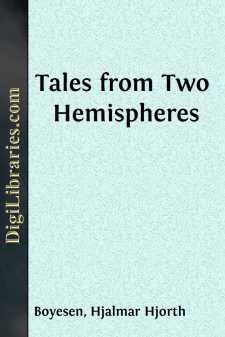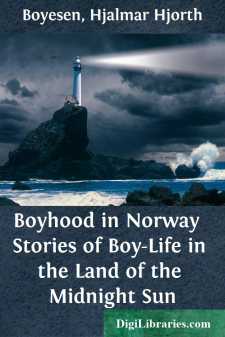Categories
- Antiques & Collectibles 13
- Architecture 36
- Art 48
- Bibles 22
- Biography & Autobiography 813
- Body, Mind & Spirit 142
- Business & Economics 28
- Children's Books 16
- Children's Fiction 13
- Computers 4
- Cooking 94
- Crafts & Hobbies 4
- Drama 346
- Education 46
- Family & Relationships 57
- Fiction 11829
- Games 19
- Gardening 17
- Health & Fitness 34
- History 1377
- House & Home 1
- Humor 147
- Juvenile Fiction 1873
- Juvenile Nonfiction 202
- Language Arts & Disciplines 88
- Law 16
- Literary Collections 686
- Literary Criticism 179
- Mathematics 13
- Medical 41
- Music 40
- Nature 179
- Non-Classifiable 1768
- Performing Arts 7
- Periodicals 1453
- Philosophy 64
- Photography 2
- Poetry 896
- Political Science 203
- Psychology 42
- Reference 154
- Religion 513
- Science 126
- Self-Help 84
- Social Science 81
- Sports & Recreation 34
- Study Aids 3
- Technology & Engineering 59
- Transportation 23
- Travel 463
- True Crime 29
Hjalmar Hjorth Boyesen
Hjalmar Hjorth Boyesen (1848–1895) was a Norwegian-American author and professor, known for his contributions to both Norwegian and American literature. He was one of the first Norwegian authors to gain recognition in the United States, with works that explored themes of immigration and cultural assimilation. Boyesen wrote several novels, including "Gunnar: A Tale of Norse Life" and "The Mammon of Unrighteousness," which reflect his deep interest in Scandinavian culture and American society. In addition to his novels, he also published essays, short stories, and scholarly works, and held academic positions at several American universities, including Columbia University.
Author's Books:
Sort by:
ILKA ON THE HILL-TOP Mr. Julius Hahn and his son Fritz were on a summer journey in the Tyrol. They had started from Mayrhofen early in the afternoon, on two meek-eyed, spiritless farm horses, and they intended to reach Ginzling before night-fall. There was a great blaze of splendor hidden somewhere behind the western mountain-tops; broad bars of fiery light were climbing the sky, and the châlets and...
more...
THE MAN WHO LOST HIS NAME. ON the second day of June, 186—, a young Norseman, Halfdan Bjerk by name, landed on the pier at Castle Garden. He passed through the straight and narrow gate where he was asked his name, birthplace, and how much money he had,—at which he grew very much frightened. "And your destination?"—demanded the gruff-looking functionary at the desk. "America," said...
more...
Ralph Grimm was born a gentleman, He had the misfortune of coming into the world some ten years later than might reasonably have been expected. Colonel Grim and his lady had celebrated twelve anniversaries of their wedding-day, and had given up all hopes of ever having a son and heir, when this late comer startled them by his unexpected appearance. The only previous addition to the family had been a...
more...
I. THE ORIGIN OF THE WAR A deadly feud was raging among the boys of Numedale. The East-Siders hated the West-Siders, and thrashed them when they got a chance; and the West-Siders, when fortune favored them, returned the compliment with interest. It required considerable courage for a boy to venture, unattended by comrades, into the territory of the enemy; and no one took the risk unless dire necessity...
more...
BJÖRNSTJERNE BJÖRNSON I Björnstjerne Björnson is the first Norwegian poet who can in any sense be called national. The national genius, with its limitations as well as its virtues, has found its living embodiment in him. Whenever he opens his mouth it is as if the nation itself were speaking. If he writes a little song, hardly a year elapses before its phrases have passed into the common speech of...
more...






